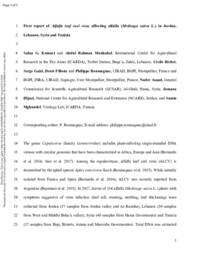First report of Alfalfa leaf curl virus affecting alfalfa (Medicago sativa L.) in Jordan, Lebanon, Syria and Tunisia

Authors:
The genus Capulavirus (family Geminiviridae) includes plant-infecting single-stranded DNA viruses with circular genomes that have been characterized in most parts of the world (Zerbini et al. 2017). Among the capulaviruses, alfalfa leaf curl virus (ALCV) is transmitted by the aphid species Aphis craccivora Koch (Roumagnac et al. 2015). While initially isolated from France and Spain (Bernardo et al. 2016), ALCV was recently reported from Argentina (Bejerman et al. 2018). In 2017, a total of 184 leaves of alfalfa (Medicago sativa L.) with symptoms suggestive of virus infection (rolling, stunting, mottling, leaf thickening) were collected from Jordan (57 samples from Jordan valley and Ar Ramtha), Lebanon (50 samples from West and Middle Beka’a valley), Syria (40 samples from Hama Governorate) and Tunisia (37 samples from Beja, Bizerte, Ariana and Manouba Governorates). Total DNA was extracted for all collected samples using DNeasy Plant Mini Kit (Qiagen). PCR-mediated detection of ALCV was performed using My TaqTM Red DNA Polymerase (Bioline) according to the manufacturer’s instructions and capulavirus-specific primers (Capula2F: GAGRAABTCGGACTTGGAKGT and Capula4R: CAYCTYCACTGYCTYGTCCA) designed based on the 47 available whole genome sequences of capulaviruses to amplify a 267-bp fragment of the coat protein gene. Amplification conditions consisted of: 95ºC for 5 min, followed by 35 cycles of 1 min at 94ºC, 1 min at 55ºC and 1 min at 72ºC, and a final extension for 10 min at 72ºC. Fifteen μl of the PCR products were analysed by electrophoresis on agarose gel (1.5%) in TBE buffer (90 mM Tris borate, 2 mM EDTA) containing 5% RedSafe™ Nucleic Acid Staining Solution (iNtRON Biotechnology) at 100 V for 45 min and visualized with a UV transilluminator. PCR results revealed that 86 samples (37 from Jordan, 7 from Lebanon, 22 from Syria and 20 from Tunisia) generated expected and clean 267 nt amplicons. DNA of four samples that tested positive for ALCV (one from each country) were then used as a template for PCR amplification of the complete genome using the HotStarTaq Plus Master Mix Kit (Qiagen) following the manufacturer’s protocol and the pair of abutting primers with a ncoI overlapping site (Cap-ncoIF: 5'-CCA TGG CCT TCA AAG GTA GCC CAA TTC AAY ATG G-3' and Cap-ncoIR: 5'-CCA TGG GGC CTT ATY CCT CKG YGA TCG-3') described in Bernardo et al. (2016). Amplification conditions consisted of: 95°C for 5 min, 35 cycles at 94°C for 20 s, 60°C for 30 s, 68°C for 165 s, and 72°C for 3 min. The amplicons were gel purified using the PCR Clean-Up System (Promega Biotech), cloned into pGEM-T Easy (Promega Biotech) and Sanger sequenced by primer walking at Genewiz. The four ALCV complete genome sequences that were obtained (GenBank accession numbers: MH020803, isolate SyAl37-17 from Syria; MH020804, isolate Tua16-17 from Tunisia; MH020805, isolate JoAl28-17 from Jordan and MH020806, isolate Lal22-17 from Lebanon) ranged in size from 2726 nt to 2745 nt in length and shared 82.2-98.5% genome-wide pairwise identity with ALCV isolates from France, Spain and Argentina. The genomes of these four isolates harbor a classical organization of ALCV isolates, including seven open reading frames and the nonanucleotide stem-loop sequence “TAATATT↓AC” in the intergenic region. In addition, these four isolates cluster with ALCV strain A. These results indicate that ALCV is widely present in alfalfa in Lebanon, Tunisia, Jordan and Syria.
